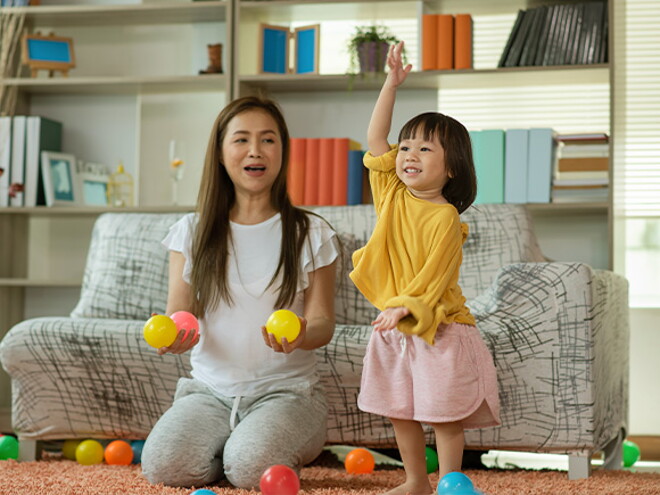
Social and Emotional Development of Children
Dr. Moses De Guzman
“My child turned one but he is not yet walking by himself, is he delayed?”
“Doc, I think my baby is advanced, she said ‘mama’ when she was 10 months old. Is she advanced?”
Many parents are concerned whether their child is developmentally delayed or advanced. It should be emphasized that children do not develop at the same rate. The developmental milestones considered as “normal” occur at a wide range. A child may be ahead in some domains while slightly behind in others. It is important to monitor the different developmental stages of your child.
There is a need to explain that a child’s development cannot be measured by a single developmental milestone. There are several areas that should be considered1:
- Gross motor - walking, climbing, running
- Fine motor - holding a spoon, drawing
- Sensory - seeing, hearing, touching, tasting, smelling
- Language - single words, phrases, sentences
- Socio-emotional - playing with others, imaginary plays
Some parents were surprised that there are other domains of growth and development. Most are familiar with physical and cognitive development as well as language and communication development; however, there are some parents who are not too familiar with social and emotional development.
As children grow, they need to learn skills on how to interact with their environment. Among healthy children, the social and emotional developmental stages occur at an expected path2. The first observable social milestone is the social smile which happens at one to two months of age. This is the infant’s response to the parent’s voice, smile, smell or touch. This is followed by the following socio-emotional developmental (milestones to determine social skills).
2 - 3 months
- Calms self
- Responsive smile
- Responds to gentle calming
4 - 5 months
- Turn-taking conversation (vocal sounds)
- Upset when toy is taken away
- Happy when given holding toy
6 -12 months
- Attachment with responsive caregiver
- stranger anxiety
12 - 18 months
- Explore environment with support from caregiver
- Interactive play (peek-a-boo, patty cake)
- Use gestures to communicate needs or interests
- Self-conscious emotions (upset when someone cries; pride when applauded)
18 - 30 months
- Individuation emerges (faces environment on his/her own)
- Pretend play (talking on phone, feeds doll)
- Play next to another child and imitate
- Manipulate emotions to more socially accepted gesture
30 - 54 months
- Impulse control
- Emergence of peer relationships
- Cooperative play and sharing
Something to watch out
Parents are advised to monitor the developmental milestones for their child. Inability to attain age-appropriate social-emotional milestones may be a manifestation of a social-emotional disturbance, like an undetected mental and emotional health problems. This may need further evaluation.
Aside from monitoring, parents can support the socio-emotional development3 of their children by:
- Providing opportunities to explore their environment and test their new skills
- Giving attention and reassurance when they need it
- Being separated from you for a short period helps them become more independent
- Assuring that you will return and continue loving them even when you are away
These are some #1ExpertTips on how to improve social skills of your child4:
- Eye contact – Encourage your child to look into the eyes when talking to people. This is a good social skill exercise as it shows that they are engaged in the situation.
- Ask questions – When having a conversation, let your child ask questions. This opens them to a new experience and connection.
- Teach emotions – Show your child the appropriate emotions during different social situations.
- Role playing - A good activity for socialization is role-playing. Ask your child to pretend to be someone famous whom you will interview. This is a good way to put your child in someone else’s shoes.
- Prepare for higher level social skills – A suggested social and emotional development activity for 3 to 5 year olds is teaching them higher level social skills. Let them practice negotiation, conflict resolution, assertiveness, non-verbal communication and public speaking.
- Be a role model – Parents play a vital role in enhancing the social skills of a child. This can be done by acting responsibly, listening, showing them good communication skills and being respectful.
- It is also important to provide your toddler with age-appropriate nutrition. Children should have adequate intake of DHA and probiotics like L. rhamnosus which supports their growth and development as well as protect them from illnesses like coughs and colds. Regularly visit your pediatrician for check-ups, monitoring, update of immunizations, and preventive guidance.
References:
[1] MedlinePlus [Internet]. Bethesda (MD): National Library of Medicine (US); [updated Jun 24; cited 2024 Apr 28]. Available from: https://medlineplus.gov/.
[2] Malik F, Marwaha R. Developmental Stages of Social Emotional Development in Children. [Updated 2022 Sep 18]. In: StatPearls [Internet]. Treasure Island (FL): StatPearls Publishing; 2024 Jan-. Available from: https://www.ncbi.nlm.nih.gov/books/NBK534819/
[3] Caring for Your Baby and Young Child: Birth to Age 5. 2009 American Academy of Pediatrics [Updated 8/1/2009]. Available from: https://www.healthychildren.org/English/ages-stages/toddler/Pages/Emotional-Development-1-Year-Olds.aspx
[4] How to improve your child’s social skills. Learning Links. Available from: https://www.learninglinks.org.au/resources/how-to-improve-social-skills/









